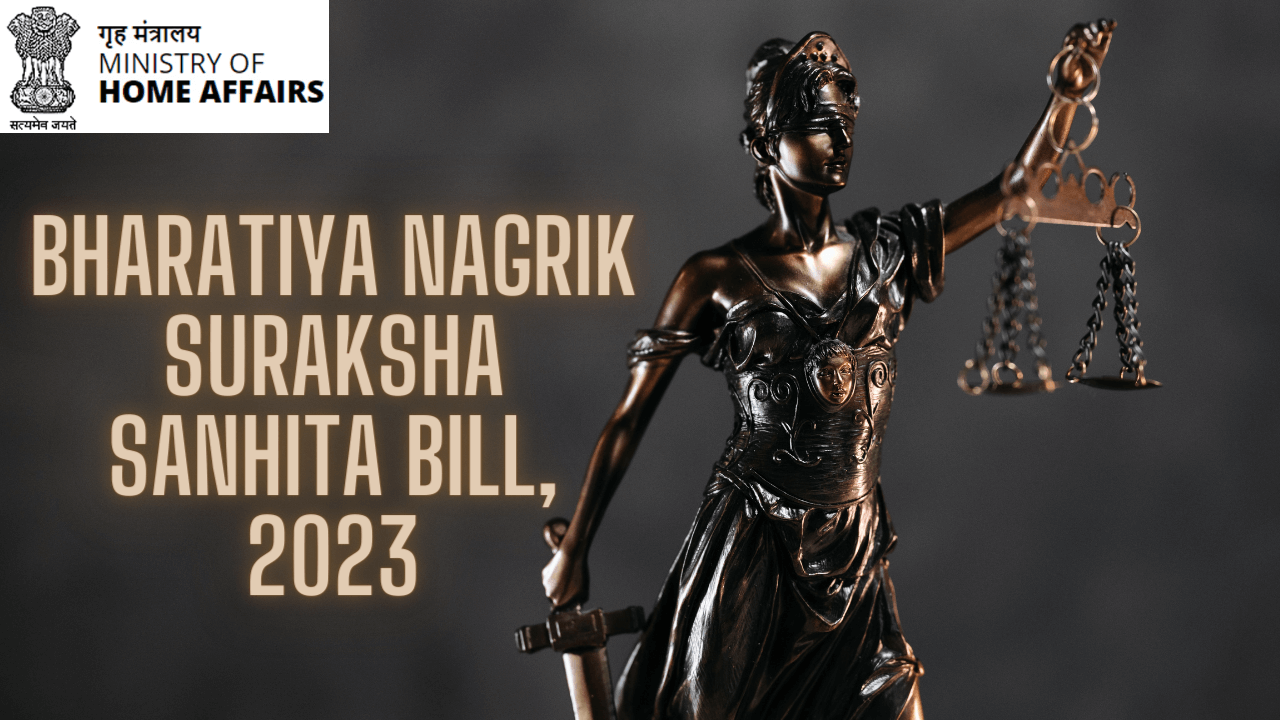Bharatiya Nagrik Suraksha Sanhita Bill 2023
Union Home Minister and Minister of Cooperation, Shri Amit Shah, has introduced three new Bills in the Lok Sabha that propose a comprehensive revamp of the country’s criminal justice system.
These three Bills are intended to replace the existing laws: the Indian Penal Code (IPC), 1860; the Code of Criminal Procedure (CrPC), 1973; and the Indian Evidence Act, 1872.
- The IPC will be replaced by the Bharatiya Nyaya Sanhita Bill, 2023.
- The CrPC will be replaced by the Bharatiya Nagarik Suraksha Sanhita Bill, 2023.
- The Indian Evidence Act will be replaced by the Bharatiya Sakshya Bill, 2023.
Criminal Law Reforms Committee
The Ministry of Home Affairs initiated a significant step towards criminal law reform by forming a committee, as indicated in a notification dated May 4, 2020. The committee was entrusted with the crucial task of reviewing the three codes of criminal law in the country.
Chairman
Chaired by Prof. (Dr.) Ranbir Singh, an esteemed former Vice Chancellor of the National Law University (NLU) in Delhi, the committee brought together legal expertise to undertake this substantial undertaking.
Mandate
The committee’s primary mandate was to propose comprehensive reforms to the nation’s criminal laws, guided by principles of effectiveness and efficiency. The aim was to modernize and strengthen these laws to better serve the evolving needs of society.
In February, the committee submitted its report.
About the Code of Criminal Procedure (CrPC)
- Enacted in 1973 (effective from 1 April 1974), the Code of Criminal Procedure (CrPC) is the primary law governing the procedural aspects of administering criminal justice in India.
- It encompasses:
- Mechanisms for investigating crimes,
- Arresting suspected individuals,
- Gathering evidence,
- Establishing the guilt or innocence of the accused,
- Determining appropriate punishments.
- Additionally, it addresses matters such as public disturbances, prevention of offenses, and providing support to spouses, children, and parents.
About the Bhartiya Nagrik Suraksha Sanhita Bill 2023
The Bharatiya Nagarik Suraksha Sanhita Bill 2023 aims to replace the CrPC.
Key Highlights of the Bharatiya Nagrik Suraksha Sanhita Bill 2023
- Embracing Technology:
- The proposed changes emphasize the increased use of technology in legal proceedings.
- This includes conducting trials, appeals, and deposition recordings through electronic means.
- Accused individuals can also provide statements via video-conferencing.
- Various legal documents, including summons, warrants, and evidence statements, can be presented electronically.
- Electronic Communication:
- The bill introduces electronic communication methods, encompassing “communication devices.”
- Individuals may be required to produce digital evidence-containing documents or devices as directed by a court or police officer for inquiries.
- Use of Handcuffs:
- Police officers can use handcuffs while arresting repeat offenders who have previously escaped custody, individuals involved in organized crime, terrorist acts, or offenses against the state.
- Enhanced Safeguards:
- Section 41A of CrPC, a safeguard against arrests, is renumbered as Section 35.
- An additional provision states that a person cannot be arrested without prior permission from an officer of at least DSP rank for offenses punishable with less than 3 years or for individuals above 60 years old.
- Mercy Petitions:
- The bill outlines procedures for filing mercy petitions in death sentence cases.
- Convicts or their legal heirs can submit mercy petitions to the Governor within 30 days after disposal of their initial petition by jail authorities.
- If rejected, the person can approach the President within 60 days, with no further appeal in any court.
- Sanction to Prosecute:
- The government must decide on granting or rejecting sanction to prosecute a public servant within 120 days of receiving a request. Failure to do so will imply a deemed accord of sanction.
- Exceptions include cases of sexual offenses, trafficking, etc.
- Arms in Procession:
- While retaining the district magistrate’s power under Section 144A to maintain public peace during processions, the bill omits the provision to prohibit carrying arms during such events.
- Samples without Arrest:
- Magistrates can order individuals to provide samples of signature, handwriting, voice, or finger impressions for investigation purposes without arrest.
- Police Detention:
- Provisions enable police to detain or remove individuals who resist, refuse, or ignore preventive action directives.
- Trial in Absentia:
- In certain stringent anti-terror laws like UAPA, an alternative framework is established. The burden of proof shifts to the accused, requiring them to prove their innocence, unlike typical criminal law where the state must prove guilt.
Significance of the Bharatiya Nagrik Suraksha Sanhita Bill 2023
- Streamlined and Efficient Criminal Procedure:
- The proposed legislation aims to consolidate and amend criminal procedure laws, emphasizing specific timelines for investigations, trials, and judgments. This approach ensures a prompt and efficient dispensation of justice.
- Speedy Justice Delivery:
- The bill’s provisions are designed to expedite the delivery of justice, aligning with the government’s commitment to providing speedy legal proceedings.
- Digital India Integration:
- Aligned with the Digital India initiative, the bill introduces provisions recognizing the admissibility of digital or electronic records as evidence, granting them equal legal validity and enforceability as traditional paper records.
- Citizen-Centric Approach:
- The legislation adopts a citizen-centric approach by ensuring the supply of a First Information Report (FIR) and keeping victims informed about case progress, including through digital communication.
- Summary Trial for Petty Offences:
- The draft proposes a summary trial mechanism for minor offenses, contributing to quicker resolution and reduced burden on the legal system.
- Zero FIR Provision:
- One notable provision is the introduction of the “Zero FIR,” which can be lodged at any police station.
- Within 15 days, the FIR must be transferred to the police station with jurisdiction over the crime location.
- Unlike traditional FIRs restricted by jurisdiction, a Zero FIR can be filed at any police station, regardless of the offense’s location.
- Weekly Current Affairs 2025 PDF For Bank, SSC, UPSC Exams
- Unsung Heroes of India: 10 Unknown Freedom Fighters You Should Know
- 26 December Current Affairs 2023 in English
- Daily Current Affairs 2025, Check Today’s Current Affairs
- April Month Current Affairs 2024, Download PDF
- June Month Current Affairs 2024, Download PDF

Hello, I’m Aditi, the creative mind behind the words at Oliveboard. As a content writer specializing in state-level exams, my mission is to unravel the complexities of exam information, ensuring aspiring candidates find clarity and confidence. Having walked the path of an aspirant myself, I bring a unique perspective to my work, crafting accessible content on Exam Notifications, Admit Cards, and Results.
At Oliveboard, I play a crucial role in empowering candidates throughout their exam journey. My dedication lies in making the seemingly daunting process not only understandable but also rewarding. Join me as I break down barriers in exam preparation, providing timely insights and valuable resources. Let’s navigate the path to success together, one well-informed step at a time.






